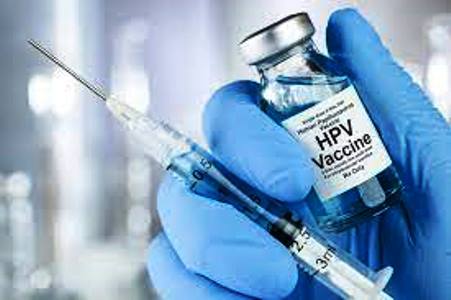A Professor of Radiology, Ifeoma Okoye, has called for increased sensitization and public engagement to refute misinformation and myths about the Human papillomavirus (HPV) vaccine.
Okoye, Director, University of Nigeria Nsukka Centre for Clinical Trials, said this in an interview on Saturday in Lagos.
Human papillomavirus (HPV) is a common sexually transmitted virus. An individual can get HPV by having vaginal, anal, or oral sex with someone who has the virus.
Almost all cervical cancer cases (99 percent) are linked to infection with high-risk HPV.
The Federal Government, on Oct. 24, introduced the HPV vaccine into the routine immunisation system to prevent cervical cancer among girls aged nine to 14 years.
The vaccination targets 7.7 million girls, which is the largest number in a single round of HPV vaccination in the African region.
The girls would receive a single dose of the vaccine, which is highly efficacious in preventing infection with HPV types 16 and 18 that are known to cause at least 70 percent of cervical cancers.
However, mixed reactions had trailed the vaccine introduction, while some members of the public were ecstatic, some had expressed concerns about vaccine safety, fear that it might promote promiscuity or cause infertility.
These concerns led some parents in some communities to prevent their children from being inoculated with the vaccine.
Okoye, who is also the founder, Breast Without Spot, an NGO, said some people lacked adequate knowledge about the importance of the vaccine to adolescent girls’ health.
“Some people are in denial. They don’t want to have anything to do with cancer because of the erroneous belief that being interested might make them get it.
“They keep saying, “It is not my portion”, they run and live in denial.
“I have gotten series of calls and messages from parents who were panicking that their girls were about to be immunised in their schools.
“I calmed them and educated them on the importance, safety and efficacy of the HPV vaccine as a cancer prevention tool which is critical to protect their daughter’s future,” she said.
She noted that equipping citizens with critical information would enable them to make informed decisions irrespective of being exposed to widespread rumours and misinformation.
According to her, the vaccine is not a new scientific discovery and evidence has shown its efficacy to protect women from cervical cancer.
She added that Australia, through the vaccine, eliminated cervical cancer two years ago, stressing that preventing vaccine-preventable deaths should be the goal of every country.
Okoye noted that several studies and clinical trials had been conducted by Nigerian researchers and the Nigerian Institute of Medical Research on the safety and efficacy of the vaccine.
“Every day, over 20 women die from cervical cancer in Nigeria and this is disturbing because these are preventable deaths. The figure could be more than that because some of them are not reported.
“If people dying from cervical cancer had these opportunities, they would be grateful. The right time to prevent the virus is before sexual exposure.
“The target of ages 9-14 was through study done in Nigeria, as the age most young girls get initiated into sexual activity.
“The vaccine doesn’t prevent pregnancy, neither does it protect against other sexually transmitted diseases, but safeguarding our girls from the grips of cervical cancer,” she said.
According to her, many developed countries have vaccinated their girls and boys against HPV, noting that global supply shortages caused by COVID-19 disruption slowed Gavi-supported vaccine introductions to many African countries.
Okoye noted that Cervarix and Gardasil vaccines cost between N35,000 and N60,000, respectively, per dose in few health facilities providing the HPV vaccine, a cost which she said was unaffordable for many citizens.
She advised Nigerians to avail themselves of the opportunity provided by the government’s intervention, noting that the vaccines are free and great tools for saving women’s lives.
The professor stressed that increasing and maintaining vaccination uptake was vital for vaccines to achieve their success, saying efforts should be intensified to dispel misinformation that could fuel vaccine hesitancy.
She noted that this was critical to vaccine shelf life and to avoid a repeat of expired vaccines which happened during COVID-19 vaccination programme.
Okoye said efforts should be intensified to strengthen public knowledge through increased sensitisation to change behaviour, constant media engagement and sharing of survivor’s stories.
The professor advised parents of girls 15-years and above who are interested in the vaccine for their daughters to do the HPV testing to make sure they don’t have the virus before they can get vaccinated.
She advised older women to conduct routine cervical cancer screening programme.
According to the World Health Organisation, in Nigeria, cervical cancer is the third most common cancer and the second most frequent cause of cancer deaths among women aged between 15 and 44 years.
Data from the health agency showed that Nigeria recorded 12,000 new cases and 8,000 deaths from cervical cancer in 2020.


